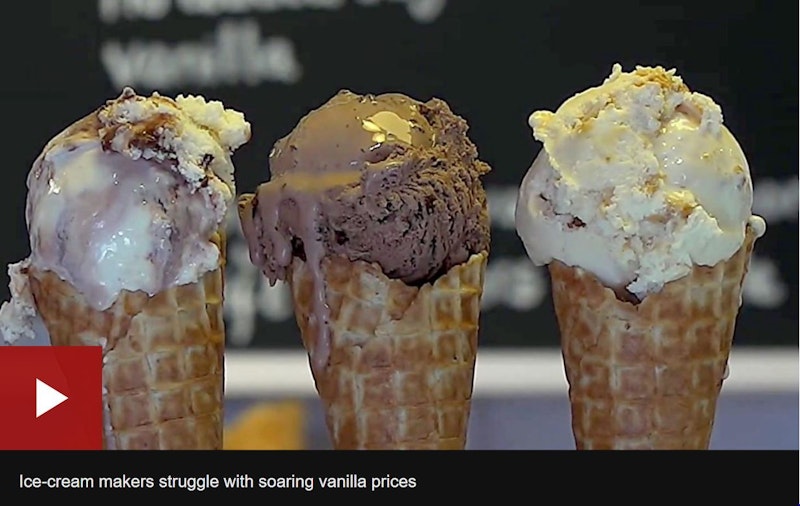In the News
Vanilla ice cream makers feel the heat
7th May 2018
Scheduling production of ice cream for the UK market must be one of the biggest operational management challenges - volatile weather means you can't plan far in advance, and when temperatures rise you need instant access to stocks of a product that is very, very perishable! But when the cost of one of your key ingredients rises 30-fold in a few months, what do you do?

Most vanilla used in ice cream manufacturing comes from Madagascar, where a cyclone last March damaged many of the farms producing vanilla pods. It takes up to five years for new plants to reach maturity, so that supply has become severely restricted. The elasticity of supply is therefore very price inelastic - as is the price elasticity of demand, as there is no genuine substitute - although there are synthetic alternatives, many users of vanilla don't want to use them. And as a result, the price has risen very steeply; try drawing a demand and supply graph to see how this happens. It is the second most expensive spice in the world (after saffron) and costs more per ounce than silver.
The BBC report * highlights how wise manufacturers like Snugburys Ice Cream, run by three sisters near Nantwich in Cheshire, spotted the problem coming and bought their vanilla in advance. "It has really gone up, so last year we decided to buy it forward by a year's-worth," said Cleo Sadler, who manages the production side of the business. "We had to make a decision as to whether we would absorb the costs - which we did in the end." Buying ahead means the sisters have sufficient stock for the coming summer and can stick to their prices. What a great example of combining ops management and stock control, with financial management and cash flow control.
Vanilla farmers will be responding by planting more of the crop, which is used not only in sweet foods but also in alcohol, cosmetics and perfumes. Farmers in Mauritius, used to growing sugar cane, are switching production to vanilla - this video explains that process, and why it takes up to five years to grow the new crop. Meanwhile, look out for substitute synthetic flavouring vanillin, which is extracted from wood and sometimes even petroleum, as a cheaper alternative in your ice cream.
You might also like
Causes of cash flow problems
Study Notes
Current Assets
Study Notes
Working Capital (Net Current Assets)
Study Notes
Stock Turnover
Study Notes
Income Elasticity of Demand
Quizzes & Activities
Business Maths - Calculating Percentage Changes
Topic Videos
Business Dividends in an Economic Crisis
Topic Videos